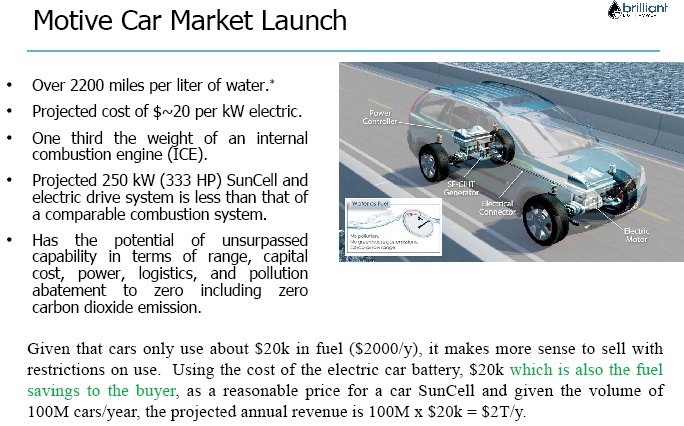Brilliant Light Power
BrLP Motive car market launch

Full TXT: https://archive.vn/pKE6H
Not to worry!
Hunter is working a deal with his Chinese friends...
He is currently attempting to find a new position...
Brilliant Light Power
BrLP Motive car market launch

The tech is changing all the time.
An electric a bit more robust than a The Villages cart would be a great option for lots of folks. Not everybody,but lots.
Bringing electrics into the mix is a good thing. No subsidies, maybe a bit to get the charging infrastructure . .. but even that is really not necessary.
Let em do battle in the market. Diesel is great for power,reliability and lengevity. Gas engines are cheap. Nuke power will bring low cost energy.
Best thing for the world? Cheap or nearly free energy.
Just curious but did the US Government ever issue a mandate that all persons must give up horses and go to the newfangled internal combustion engine?
If not, why are they now issuing mandates that autos must be electric in the future? Why not let the FREE MARKET dictate what people will drive?
From https://www.chattanoogan.com/2021/11/28/439121/Roy-Exum-Nope-No-EV-For-Me.aspx (more info at the link)
If you want to inflict maximum damage on the environment, you support EVs, wind turbines and solar panels – all with their associated batteries. They don’t even come close in being as environmentally clean as coal, natural gas, and nuclear power. Likewise, their (EVs, WTs, and Solar) cost is going to be exorbitant. WTs and Solar reliability is poor.
Electric vehicles are taxpayer subsidized for the purchase of each hybrid or fully electric vehicle with a discount of about $7,000. Then, the government does not collect road-use taxes. Further, the new infrastructure bill provides several billion dollars of taxpayer funds to build charging stations. Do we really want our Government in the “electric filling-station” business?
The original “push push” they have is much more green.
Not. At. Gunpoint.
"In May, the International Energy Agency reported that an electric-vehicle motor requires “upwards of 1 kilogram,” or more than 2 pounds, of rare-earth elements.
The same report found that China controls about 85% of the global supply of those elements and that the “geographical concentration of production” of critical minerals—
including rare earths, lithium, copper and cobalt—“is unlikely to change in the near term.” "
In addition to controlling 85% of the earths 'rare earth minerals , China also has about the same percentage of the world's processing plants for these same materials.
Due to the lack of environmental regulations, the world's refiners and smelters have yielded and deferred to China for production of these minerals.
So, China owns and will control the 'rare earth' market necessary for electric vehicles.
Also, since China has formulated an agreement with the Taliban in bankrupt Afghanistan for mineral mining, there is a former untapped mining opportunity being exploited
in the mineral resource rich country (gold, silver, coal, rare earth, petroleum, etc.)
In fact, through the " Belt and Road " program, China is in the process of building a railroad to their Afghanistan neighbor to more easily transport these mineral deposits.
Due to China's control of the market, expect the cost of these raw materials for electric automobiles to increase accordingly.
Didn’t I hear about lots and lots of Lithium to be mined in our own state of Maine. Crickets. Our own EPA will sink it until 2056 !
Can you spot the Joe Biden effect on lithium prices?
http://www.dailymetalprice.com/metalpricecharts.php?c=li&u=lb&d=0
Article posted here on FR years ago how Japan was going to mine REEs from the ocean floor, where they exist in abundance.
If we figure out all of the costs, can we then find a way to compare the fuels and vehicles more equally for average daily drivers to understand?
It takes energy to create and make available the Y amount of energy we then we use to move our vehicle Z from point A to point B.
For example, how much does it cost to produce and then make available the gasoline required to do that Y amount of energy required? Or the diesel fuel required?
How do those costs compare to costs of the various fuels used to produce and store the electrical energy needed to do that same work in an EV, along with the costs of the batteries that store it? To me, it’s always been about the batteries.
When you add all of today’s costs and losses together, how do electrically powered and combustion powered vehicle Zs compare?
Battery life and replacement cost accounting over time with EVs adds some clarity to these comparisons.
Otoh, new discoveries and potential future battery tech could change everything, along with the world that depends on energy.
But, are we there yet now with EVs or is combustion power still more cost effective?